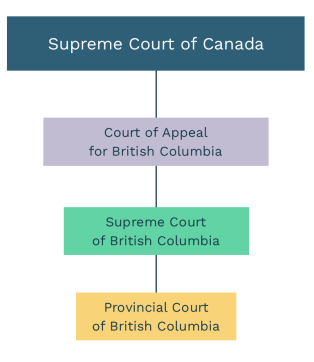Provincial Court and the Canadian court system
Provincial Court’s mission, vision, core values and goals
MISSION
As an independent judiciary, the mission of the Provincial Court of British Columbia is to impartially and consistently provide a forum for justice that assumes equal access for all, enhances respect for the rule of law, and builds confidence in the administration of justice.
VISION
To provide an accessible, fair, efficient and innovative system of justice for the benefit of the public.
CORE VALUES
- Independence
- Fairness
- Integrity
- Excellence
GOALS
- excel in the delivery of justice
- enhance meaningful public access to the Court, its facilities and processes
- anticipate and meet the needs of society through continuing judicial innovations and reform
- ensure that administration and management of the Court is transparent, fair, effective and efficient, consistent with the principles of judicial independence
Canadian court system
The BC Provincial Court is one of two trial courts in BC and part of a court system with four levels. There are three levels of court in BC and a fourth level that deals with appeals for all of Canada.

The Provincial Court is a statutory court established by the Provincial Court Act. This means it can only deal with matters assigned to it by a statute. The Court deals with the majority of the cases in British Columbia, including most: civil lawsuits for claims between $5001 and $35,000 (small claims); family law cases; traffic, ticket and bylaw matters; and criminal cases for both adults and youth.
The Court is committed to:
- Being independent, impartial and consistent
- Ensuring equal access for everyone
- Maintaining respect for the rule of law
- Contributing to confidence in the administration of justice
- Reflecting the core values of independence, fairness, integrity and excellence
The Government of BC appoints Provincial Court judges and judicial justices. Provincial Court judges and judicial justices conduct trials and hearings. Judges also conduct conferences to help people settle their court cases. The Court handles more than 130,000 new cases each year.
Depending on the type of case, Provincial Court decisions may be appealed to the BC Supreme Court or to the BC Court of Appeal.
The BC Supreme Court is both a trial court and an appeal court. The Government of Canada appoints judges to the BC Supreme Court.
Provincial Court judges do not conduct trials for some criminal offences like murder, and do not deal with divorce and division of family property, civil lawsuits for more than $35,000 or trials with juries. BC Supreme Court judges hear those cases.
Appeals of some Provincial Court decisions go to the BC Supreme Court.
The Court of Appeal doesn't conduct trials, it hears appeals of decisions from the BC Supreme Court and the Provincial Court. The Government of Canada appoints judges to the Court of Appeal.
The Supreme Court of Canada is an appeal court. It hears appeals from decisions of all provincial and territorial courts of appeal, the military Court Martial Appeal Court and the Federal Court of Appeal.
Do not get confused! The BC Supreme Court and the Supreme Court of Canada are two different courts with different responsibilities.
